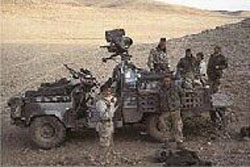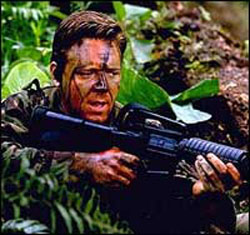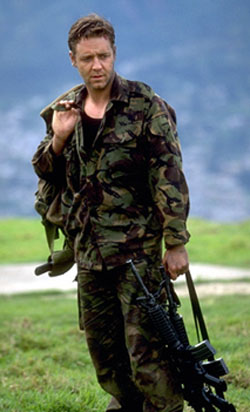|
"The will to live is the greatest factor in
survival itself." |
||
|
Background 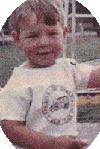 He had his mother's blond hair until he
was five or six, when it darkened and only summers spent in the
sun brought it close to its original shade. His green
eyes favored his father, as did his build, solid and broad-shouldered
from the time he was young, though he never quite reached six feet. Most of his days as a kid were
spent chasing animals in the bush, playing rugby and helping out in
his dad's pub. He had his mother's blond hair until he
was five or six, when it darkened and only summers spent in the
sun brought it close to its original shade. His green
eyes favored his father, as did his build, solid and broad-shouldered
from the time he was young, though he never quite reached six feet. Most of his days as a kid were
spent chasing animals in the bush, playing rugby and helping out in
his dad's pub.
Birthdays were always a special occasion around the house, as was any excuse for the family to get together. Even Saturdays would do. Presents notwithstanding, Terry dreaded his birthday celebration, which without fail would end up with the story of the night of his conception as told by his extremely snockered pop. When he was 10 years old he broke his left arm in a fall from the second floor of a vacant building after climbing up to crumbling balcony on a dare. It was more a badge of honor to him than anything, and one in a long line of minor injuries resulting from his willingness to try just about anything once.
He had several playmates, most of whom he
still keeps track of and sees when he visits home. They get
together and get piss drunk, staggering home around daybreak and
proving that he'll never be too big to be hollered at by
his mum. Always closest to him was his cousin, Addie. Handsome
but a little awkward into his teens, he had few girlfriends, and she
provided him with most of his reference for future dealings with the
opposite gender.
He was given the nickname Darwin, named,
as some were, after his hometown. Later, though, his fellow
soldiers began to equate it more with the naturalist than the
town. It didn't take long to realize the
major lack of action in his home country and he headed
for another, moving in with cousins in London before joining the British army. His intelligence and
enthusiasm brought him to the attention of his superiors, one of whom
recommended him for Selection into the Special Air
Service.
Despite starting out with a raging bout of the flu, Terry made it through the
physically and mentally exhausting tryouts and in 1986 found himself
accepted into one of the most respected and feared elite military
units in the world.
That was also the year that his grandfather, after whom he was named, passed away. They had always been close and the elder Terrence, a decorated veteran of World War II, was the first member of the family to fully support and encourage Terry's choice to join the military. Two months into his training, Terry was a passenger on a helicopter that went down off the coast of England when the pilot was knocked unconscious by heavy, wind-induced turbulence. No one else on board knew how to pilot the craft -- not that they didn't try -- and it plunged into the icy waters of the Atlantic. None of the men were killed or even seriously injured in the crash, but the incident inspired Terry to learn how to pilot both rotary and fixed-wing, prop-driven aircraft. The standard six months required training with Special Projects landed him in Belfast, Northern Ireland and gave him his first up-close and personal experience with terrorism. He was struck, particularly, by how the populace appeared to have grown accustomed to the constant threat of violence. The time he spent there sparked an interest in counter-terrorism, something he would return to later in his career. During the Gulf War, SAS teams were inserted deep within Iraq to search for mobile Scud launchers. They would locate the launchers and then call in air strikes or dispatch the missiles themselves. Within nine days of the war's beginning, Scud launches from the SAS' area of responsibility had stopped entirely. On January 22, 1991, Terry was part of an eight-man team dropped deep behind Iraqi lines. The team was compromised twenty-four hours after insertion when they were spotted by a young goatherd. They tried to escape west to Syria -- over 150 miles away. A faulty radio made communications impossible and the team was split up during the worst weather the region had experienced in 30 years. Of the original eight-man team four were captured, two were killed by enemy soldiers and one died of exposure. Dehydrated, half-starved and wounded in a firefight that killed his remaining companions, Terry managed to make it alone across the Syrian border to safety -- a journey of 180 miles -- on foot. Despite a quick recovery from his physical injuries, Terry suffered from recurring nightmares for years afterward, even resorting to medication -- and when that wasn't available, some very serious drinking -- to get himself to sleep. He never allowed it to affect his performance and in fact managed to keep any sign that all was not well hidden from his superiors.
Following the war he requested a return to his
former Special Projects counter-terrorism assignment, serving in the
Middle East, Eastern Europe and Russia, the latter mission for
which he went by the name Piotr Rodchenko and learned
to speak Russian fluently. He also returned to Northern
Ireland, infiltrating a branch of the IRA under the guise of a
disgruntled ex-army grunt named Erin Hill.
It was during this time that Terry was called upon to carry out missions that would have no doubt been frowned upon by the UN. His miraculous escape from Iraq as well as his previous record had drawn the attention of his superiors. They believed that his ability to think on his feet and his strong survival instinct would combine well with training in the field of espionage. And they were right. He was introduced to a man named Cyril Graham -- no rank was ever mentioned and Terry wasn't altogether certain that the man belonged to the military at all. Under Graham's tutelage, Terry proved to be a consummate bullshit artist, able to infuse his words and manner with an utterly believable sincerity. He was versed in all the latest related technology, though he preferred not to rely on it. He was taught how to obtain and copy sensitive documents, acted as a courier between high-ranking officials -- carrying top secret materials and contraband across borders all over the world, and participated in the unsanctioned rescues of British and Australian nationals taken hostage by terrorists or foreign governments. All this while still maintaining his work with the SAS. On assignment in Israel, he and four Israeli soldiers were fired on near Qiryat Shemona, close to the Lebanese border. Responding to the attack, they killed one of their assailants and wounded two others, discovering later that all were under the age of sixteen.
Together with his experiences in
Northern Ireland, this prompted him to delve even further into the
field of counter-terrorism and hostage negotiation until in 1997 he
retired from the SAS to teach both military and police personnel
around the world. He's worked with the FBI and Scotland
Yard, as well as the authorities in his native Australia as an advisor on
hostage negotiations and counter-terrorist measures.
His work with worldwide police and military organizations has allowed him the freedom to continue his extracurricular operations virtually unnoticed, though for several different employers over the last three years. Terry scrupulously avoids jobs that directly contradict his counter-terrorist efforts, and there are organizations, governments and individuals with whom he will refuse to work regardless of the fee. On the relationship front, Terry's career has left him little time for anything long-term, even as a civilian. He's still very close to his cousin, Addie, but their relationship these days consists mostly of long letters and high phone bills. With the exception of a small flat in London he doesn't have any real base of operations, living exclusively in hotels and driving rented cars. Proceed to
WEAPONS
and EQUIPMENT |
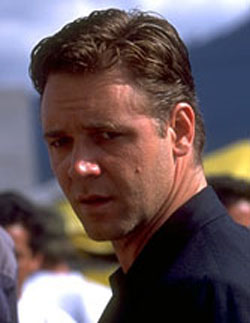
|
|
 Terry
was always bright but had little interest in school, never earning more
than average marks before he dropped out altogether at
sixteen. He made a living working odd jobs around town until the
following year when coverage of the invasion of the Falkland Islands
inspired him to join the Australian army.
Terry
was always bright but had little interest in school, never earning more
than average marks before he dropped out altogether at
sixteen. He made a living working odd jobs around town until the
following year when coverage of the invasion of the Falkland Islands
inspired him to join the Australian army. 